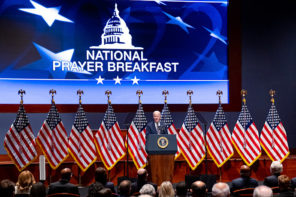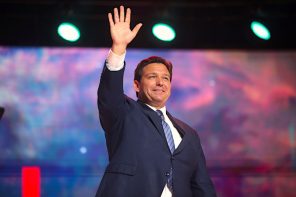I rarely agree with Michael Sean Winter’s column in the National Catholic Reporter beyond his generally pro-social justice take on immigration and economics. Like many so-called progressive male Catholic columnists, I believe he has a significant blind spot when it comes to the intersectionality of reproductive health issues and social justice. And I would argue that his take on “religious freedom” as it applies to non-profit Catholic institutions and the provision of birth control lacks both an understanding of the policy framework of the issue and the reality that many Catholic institutions had already developed workarounds to provide such coverage that satisfied their institutional “conscience.”
So as much as it pains me to admit it, Winters’ latest post is 100 percent correct. In discussing the stir that President Obama created yesterday at the National Prayer Breakfast when he chided Christians for conveniently forgetting their history of committing atrocities, such as the Crusades and the Inquisition, in the name of religion, he writes:
Indeed, the best way to point out that the specific conflation of religion and government evidenced by the Inquisition was bad for both would be for the president to say, ‘So, why are we, a bunch of politicians, hosting a prayer breakfast?’
Winters goes on to question Obama’s comment that those who commit acts of terror in the name of Islam are “betraying it”—not for what the president said, which is, he notes, similar to statements made by George W. Bush, but for the appropriateness of any president asserting “what is, and is not, a ‘betrayal’ of a religious creed.”
“Can you imagine any president offering a similar commentary on which variety of Judaism or Christianity is the ‘true’ variety and which the false?,” asks Winters.
And as long as he’s on the subject of the inappropriate, and sometimes “cynical,” conflation of politics and religion, Winters adds:
I confess I am very wary of the Pope’s addressing Congress: The optics seems all wrong, such a specifically political setting, and a powerful one too. Note to papal visit planners: The White House, the Capitol, the UN, even in its way the National Shrine, none of these really represent the peripheries where Pope Francis is most comfortable and where he has repeatedly said he wants the Church to be. I get creeped out when, at the Red Mass, they play the national anthem after the processional hymn but before the Mass begins in earnest.
I for one am more than a little creeped out by the idea of Pope Francis addressing Congress. Not because I don’t think he will say things that many prove useful to the United States as we address growing income equality, a disastrous immigration policy and the challenge of climate change, but because the forum is inappropriate. Even Pope John Paul II, who was a much more political pope than Francis, made most of his historic addresses in the United States at large, open-air masses and similar venues where his comments where clearly situated within the appropriate religious context.
But no religious leader has ever addressed a joint meeting of Congress. According to the official history of the House of Representatives, only foreign heads of state have addressed joint meetings of Congress, with the exception of Lech Walesa in 1989, who, as head of the Solidarity Union at the time, was basically Poland’s opposition leader.
Of course that’s the rub. Because the Vatican is a physical territory, what’s left of the old Papal States, it is recognized as a nation-state. And as the head of the Holy See, the government of the Roman Catholic Church, Pope Francis is both a head of state and a religious leader. But he will be received, and will address Congress, as a religious leader—a privilege that isn’t likely to be extended to the representative of any other religion any time soon.
The irony is that Pope Francis’ address will fall almost 55 years to the day that John F. Kennedy gave his famous speech to the Greater Houston Ministerial Association asserting his independence from the Vatican (after a group of prominent Protestant ministers questioned his fitness for office because he was a Catholic and presumably beholden to the pope).
Maybe instead of falling over themselves to entangle religion in the visible symbol of our civic life as a nation–no matter how much of a rock star the pope is–members of Congress should read Kennedy’s speech:
I believe in an America where the separation of church and state is absolute, where no Catholic prelate would tell the president (should he be Catholic) how to act, and no Protestant minister would tell his parishioners for whom to vote; where no church or church school is granted any public funds or political preference…
I believe in an America that is officially neither Catholic, Protestant nor Jewish; where no public official either requests or accepts instructions on public policy from the Pope, the National Council of Churches or any other ecclesiastical source; where no religious body seeks to impose its will directly or indirectly upon the general populace or the public acts of its officials….




